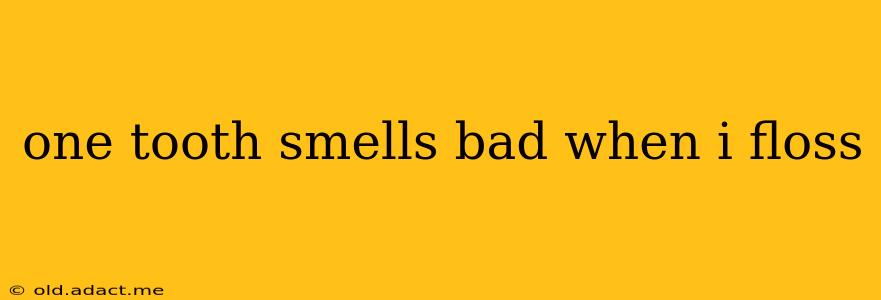Flossing is crucial for maintaining good oral hygiene, but discovering a persistently bad smell emanating from just one tooth after flossing can be alarming. This isn't just a matter of bad breath; it points to a potential underlying dental issue that requires attention. Let's explore the common culprits and how to address them.
What Causes a Single Tooth to Smell Bad After Flossing?
The unpleasant odor likely stems from bacterial activity trapped between your teeth or beneath the gum line. This bacteria thrives on food particles and produces volatile sulfur compounds (VSCs), the primary cause of bad breath. However, pinpointing the source to a single tooth suggests a more localized problem, possibly one of the following:
-
Decay (Cavities): A cavity creates a perfect breeding ground for bacteria. As the decay progresses, it penetrates deeper into the tooth, releasing foul-smelling gases. Flossing can dislodge food particles trapped in the cavity, exacerbating the odor.
-
Gum Disease (Gingivitis or Periodontitis): Inflammation and infection of the gums can lead to pockets forming between the teeth and gums. These pockets harbor bacteria, which produce a distinct unpleasant smell. Flossing in these areas might bring the odor to the surface.
-
Abscess: An abscess is a pocket of pus that forms at the root of a tooth due to an infection. This pus emits a strong, unpleasant odor. Flossing near an abscess can aggravate the problem.
-
Food Impaction: Sometimes, a piece of food can become lodged between teeth or under the gum line, leading to decay and a foul smell. Flossing might remove the food, but the resulting odor indicates a deeper issue.
-
Damaged Filling or Crown: A poorly placed or damaged filling or crown can create a gap where food particles accumulate and bacteria can thrive.
-
Dental Trauma: A cracked or chipped tooth can also trap food debris and contribute to the odor.
What Should I Do If One Tooth Smells Bad?
Ignoring the problem will only worsen the underlying issue. Here's what you should do:
1. Thorough Cleaning: While flossing helps, carefully brush the affected area with fluoride toothpaste. Pay close attention to the gum line.
2. Schedule a Dental Appointment: This is crucial. A dentist can accurately diagnose the cause of the bad smell. They will examine the tooth and gums, potentially taking X-rays to assess the extent of any damage.
3. Professional Cleaning: Your dentist may recommend a professional cleaning to remove plaque and tartar buildup.
4. Treatment for Underlying Conditions: Depending on the diagnosis, treatment might involve filling cavities, root canal therapy (for abscesses or severe infections), gum disease treatment, replacing a damaged filling or crown, or other necessary procedures.
How Can I Prevent This from Happening Again?
Prevention is key! Here are some tips:
-
Consistent Oral Hygiene: Brush twice daily for two minutes each time, and floss daily.
-
Healthy Diet: Limit sugary and acidic foods and drinks, which contribute to tooth decay.
-
Regular Dental Checkups: Visit your dentist for routine checkups and cleanings at least twice a year. Early detection of dental problems significantly improves treatment outcomes.
-
Mouthwash: Using an antimicrobial mouthwash can help control bad breath, but it's not a substitute for proper brushing and flossing.
Frequently Asked Questions
Can a bad-smelling tooth indicate a serious health problem?
Yes, a persistently bad-smelling tooth can be a sign of a serious infection that requires immediate professional attention. Neglecting the problem can lead to further complications, such as the spread of infection, tooth loss, or even systemic health issues.
Why does only one tooth smell bad and not the others?
The odor is typically localized due to a specific problem affecting that particular tooth, such as a cavity, abscess, or gum disease concentrated in that area.
Will the smell go away on its own?
No, the smell is a symptom of an underlying dental problem. It will not resolve itself and will likely worsen without professional intervention. Seeking immediate dental care is essential.
How long does it take to treat a bad-smelling tooth?
The treatment time varies depending on the severity of the problem. Minor issues like a small cavity might require a single filling, while more complex problems like an abscess may require multiple visits and procedures.
By understanding the potential causes of a bad-smelling tooth and taking prompt action, you can protect your oral health and prevent more significant dental problems from developing. Remember, regular dental checkups and consistent oral hygiene are your best defense against this and other dental issues.
